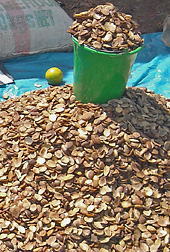This page has been archived and is being provided for reference purposes only. The page is no longer being updated, and therefore, links on the page may be invalid.
| Read the magazine story to find out more. |
|
|
Dietary Products: Some are Under-researched, Over-marketed
By Rosalie Marion Bliss
March 20, 2014
While surfing the Web, consumers often see ads promising "one tip to a flat belly." But the real tip is accurate consumer information about the products that are being marketed.
African mango (AM) supplements are among the various products that appear at the end of these "one tip" ads. U.S. Department of Agriculture (USDA) scientists have studied African mango supplements and found that none of the labels on the ones they tested provided accurate information for consumers.
All of the labels of African mango dietary supplement products sold in the United States list African mango seed extract as the major ingredient, according to chemist Pei Chen and postdoctoral associate Jianghao Sun. Chen and Sun conducted the research at the Agricultural Research Service (ARS) Beltsville Human Nutrition Research Center in Beltsville, Md. ARS is USDA's chief intramural scientific research agency.
Chen and Sun noted a lack of past chemical analyses of AM seeds, seed extracts and dietary supplements in the scientific literature, and conducted the studies to find out whether the supplements contain what they say they contain. The team obtained AM seeds that had been imported directly from Africa for the study. The samples came with a voucher verifying their authenticity, and were further authenticated by a U.S. Pharmacopeia scientist. The team also obtained three AM seed extracts and five different AM dietary supplements to analyze.
During testing, Chen and Sun identified a group of major components in the verified AM seeds: ellagic acid; mono-, di-, and tri-O-methyl-ellagic acids; and their related glycosides. These components can be used as authentication markers when testing the contents of AM extracts and related AM dietary supplements for quality control.
Among the five AM dietary supplements tested, only one contained trace amounts of AM seed. The other four supplements and the three AM seed extract samples did not contain any detectable amount of authentic AM seed.
Read more about this research in the March 2014 issue of Agricultural Research magazine.

